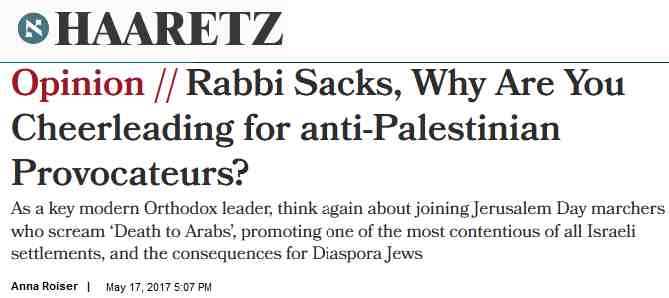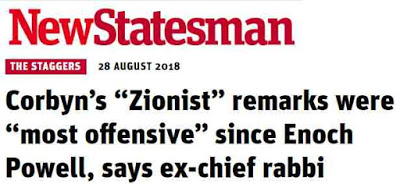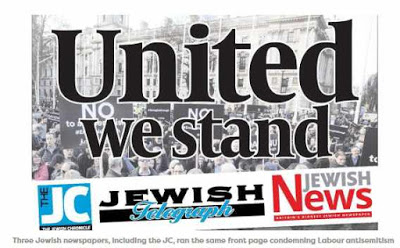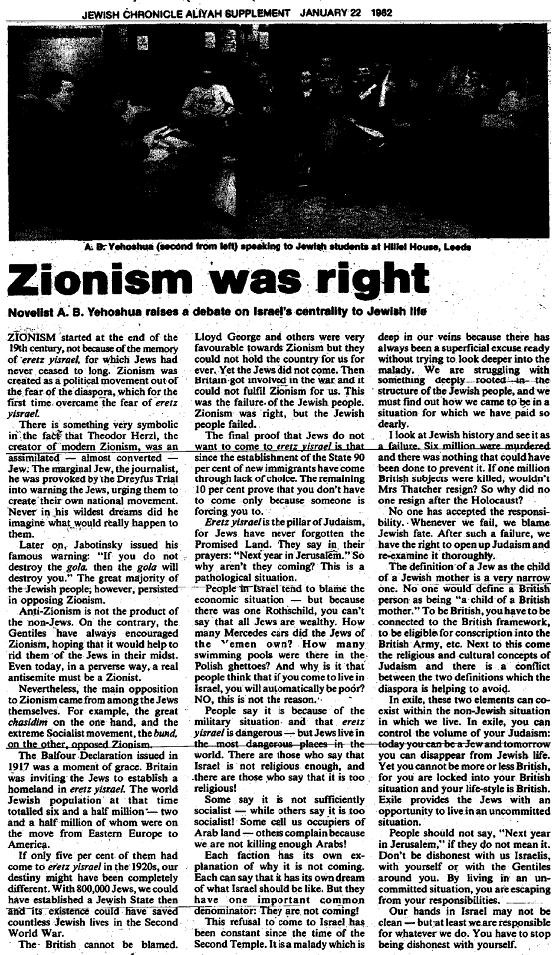In 2017 Rabbi Sacks marched with thousands of settler racists through Arab
East Jerusalem chanting ‘Death to the Arabs’
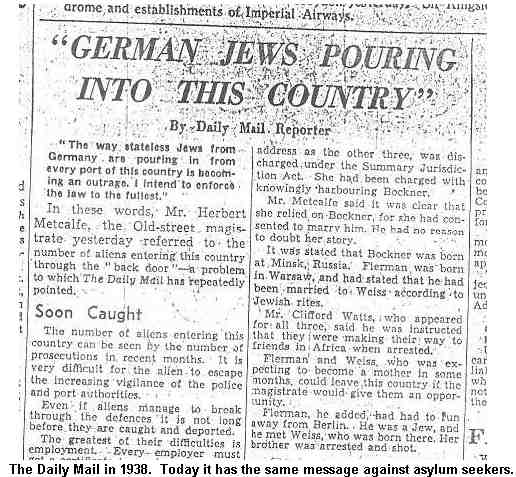 |
| The Daily Mail in its pro-Hitler days warns against Jewish refugees entering ‘through the back door’ |
with the New Statesman, the house journal of the Labour Right and the anti-Corbyn
campaign, former Chief Rabbi Jonathan Sacks engaged in a piece of vitriol worthy
of Goebbels himself. Not surprisingly,
the Daily Mail, which in the 1930’s campaigned against the entry of Jewish refugees
from Nazi Germany to Britain and which latterly employed Katie Hopkins as its
columnist, cheered him to the rafters.
quoted Sacks as saying that Corbyn’s criticism of Richard Millett, an
open fascist, ‘was the most offensive remark by a British politician
since Enoch Powell’s Rivers of Blood speech in 1968.’ Outrageous and absurd hyperbole
seems to be the Zionist substitute for anything approximating to rational
thought and polemic. Less than a month
ago, Britain’s 3 Zionist papers published
a joint editorial which spoke of ‘ the existential threat to Jewish life in this country that
would be posed by a Jeremy Corbyn-led government’ with barely a murmur from
rational people.
to someone’s life. What these 3
propaganda rags were saying was that Corbyn was literally a threat to the Jewish
community along the lines of Adolf Hitler.
Presumably under a Jeremy Corbyn administration the British version of Auschwitz
would be opening its doors for business. And then these Zionists complain about
comparisons between Israel and Nazi Germany and via the IHRA denounce those who
make such a campaign as ‘anti-Semites’.
 |
| The Daily Mail, which backed Enoch Powell in 1968, now has the audacity to compare Corbyn with its erstwhile hero |
of child abuse fame compared the threat of disciplinary proceedings to the
experiences of her father who fled the Nazis, it would seem that exaggeration
and hyperbole are the main fare of Zionism these days.
of Israel, British Zionists have lost all sense of proportion. The idea that someone who was arrested
outside South Africa House protesting against Apartheid has now become an SA
stormtrooper is too silly for words.
However this is understandable.
How else do you defend a state where Arab life is cheap, where Arab
homes are demolished to make way for Jewish homes and where Arab and Jewish
are segregated
in maternity wards if not by demonising your opponents and engaging in the
type of abuse that would be better suited to Smithfields market? It says a great deal about Zionist intellectuals
that they have to get down into the gutter in order to defend the racist Rottweiler
that is the Israeli state.
Anshel Pfeffer to the virulently anti-Corbyn Campaign Against Antisemitism which claimed that in an
opinion poll more than half of British Jews felt that anti-Semitism today echoed
that of the 1930s. Pfeffer witheringly observed that if the CAA and British Jews “actually believe that, then
it’s hard to take anything they say about contemporary anti-Semitism in their
home country seriously.”
hysteria … not only are they woefully ignorant of recent Jewish history but
have little concept of what real anti-Semitism is.” Which just about sums
up Jonathan Sacks too.
Powell is not only extraordinarily offensive but it is in itself anti-Semitic.
What he and the rest of the empty chorus of Zionist propagandists are doing is
to belittle and minimise the experience of Jews who in the past faced real anti-Semitism. To compare opposition to Zionism and Israeli Apartheid
with anti-Semitism simply minimises and trivialises the bloody pogroms of Czarist
Russia to say nothing of the tribulations of German and European Jewry under Nazi
occupation. It is somewhat ironic that
the Zionist movement which never fought anti-Semitism and in the case of Nazi Germany
actively collaborated with it now dons the mantle of the opponents of anti-Semitism.
battle that the Board of Deputies explicitly told British Jews to stay away
from. They and the English Zionists told Jews to avoid the fascists and keep
their heads down. They repeated this in the 1970’s in the fight against the
National Front. The reason Zionism has never fought fascism or anti-Semitism is because it shares too much in common with anti-Semitism
to ever fight it. As one of Israel’s
foremost novelists and poets, A B Yehoshua observed
‘even today a real anti-Semite must also
be a Zionist.’ Both agree that Jews ‘real home’ is not where they are
living but in Israel.
that at a speech in 2013, Corbyn said of a group of British “Zionists”:“They clearly have two problems. One is they
don’t want to study history and, secondly, having lived in this country for a
very long time, probably all their lives, they don’t understand English irony
either.”
these throwaway remarks that Corbyn had threatened ‘the
existence of an entire group of British citizens by depicting them as
essentially alien.’ Now Sacks is an erudite fellow with a clutch
of degrees. For him to make cheap and
populist remarks like this, in order to gain the plaudits of the right-wing anti-immigrant
British press (and the BBC of course) is a measure of how Zionist intellectuals
will prostitute their talents for the sake of Zionism and petty nationalism.
This is a measure of how far Zionism will go as it debases the currency of
political debate.
couple of far-Right British Zionists not
Jews. He never mentioned their religion.
It was entirely irrelevant to him.
The whole of Sack’s intellectual edifice is based on this assumption, an
assumption that is the staple diet of Zionism, that being Jewish means being a Zionist. Corbyn however made his position quite clear. In a statement to the Guardian Corbyn
said he had used the term Zionists “in
the accurate political sense and not as a euphemism for Jewish people”. He also
added: “I am now more careful with how I
might use the term ‘Zionist’ because a once self-identifying political term has
been increasingly hijacked by anti-Semites as code for Jews.” On this Corbyn is wrong Anti-Semites tend to do this less and less
now. It is Zionists who insist on
conflating Jew with Zionist and then drawing the conclusion that to be a Jew is
to be a Zionist.
like the neo-Nazi founder of America’s alt-Right, Richard Spencer, defines
himself as a White
Zionist. Nor is Spencer alone. Think
of any major far-Right or neo-Nazi political leader or movement in Europe today
and almost without exception they are pro-Israel and pro-Zionist. Le Pen, Strache, Geert Wilders, Alternative
for Germany, Matteo Salvini – today’s far Right are focused on Muslims and in
the process they too have become philo-Semitic.
erudite rabbis in Britain, certainly in comparison with his almost embarrassing
successor, Ephraim Mirvis. It is a sad
commentary on the corrosive effects of Zionist nationalism that it makes
Philistines out of otherwise learned Jews!
Nothing is more contemptible than seeing an intellectual like Jonathan
Sacks lower himself in order to make cheap and demagogic points and play to the
populist crowd. That is precisely what Enoch Powell, a classics scholar did
with his Rivers of Blood speech. Ironically
if anyone resembles Enoch Powell it is Rabbi Jonathan Sacks himself.
modern Orthodox leader, think again about joining Jerusalem Day marchers who
scream ‘Death to Arabs’, promoting one of the most contentious of all Israeli
settlements, and the consequences for Diaspora Jews
ignorant of the occupation. There were no dotted lines on our maps of Israel,
no Palestinians seeking self-determination, only millions of hostile Arabs
wanting our land. Supporting Israel meant supporting Israel’s control of the
whole land; I knew of no other option.
 |
| Israeli authorities order Palestinian businesses to close for the Jerusalem Day “March of Flags” through the Muslim Quarter of Jerusalem. May 6, 2016 Olivier Fitoussi |
British Jews of my generation. It is common even now in both formal and
informal settings to reject the use of that word to describe the situation in
the West Bank.
Great Britain, member of the House of Lords, a high-profile member of both
Yeshiva University and New York University’s faculty, and one of the most
eminent modern Orthodox rabbis of his generation, to extend a “personal
invitation” to Diaspora Jews to join him on a trip to Israel which includes
“leading” the March of the Flags on Jerusalem Day and “dancing with our brave
IDF soldiers” in the radical settler enclave inside the city of Hebron. The trip, marking the
50th anniversary of the reunification of Jerusalem, is run by Mizrachi Olami,
the parent organisation of Bnei Akiva.
passes through the Old City’s Damascus Gate in East Jerusalem and proceeds
through the Muslim quarter. In his promotional video for the trip Rabbi Sacks
quotes Psalms: “Jerusalem is rebuilt like a city that is compact together” and
goes on to say, “of course that’s what we see each time we visit Jerusalem
today”.
divided city by issuing closure orders to Palestinian businesses along the
route, and preventing Palestinian residents from being on the streets.
with hate speech and violence. Haaretz’s Bradley Burston describes it as “an
annual, gender-segregated extreme-right, pro-occupation religious carnival of
hatred, marking the anniversary of Israel’s capture of Jerusalem by humiliating
the city’s Palestinian Muslims marchers vandalized shops in Jerusalem’s Muslim
Quarter, chanted “Death to Arabs” and “The (Jewish) Temple Will
Be Built, the (Al Aqsa) Mosque will be Burned Down,” shattered windows and
door locks, and poured glue into the locks of shops forced to close for fear of
further damage.”
Patriarchs, the group will visit one of the most contentious of all the
settlements. It comprises a few hundred Jews in the centre of a city of 150,000
Palestinians, heavily guarded by the Israeli army and causing huge ongoing
disruption to the Palestinian population. ‘Dancing with soldiers’ in the
streets of this settlement enclave is an unequivocal show of support for the
settlers’ presence there, and of disregard to local Palestinians living under a
form of
perpetual siege.
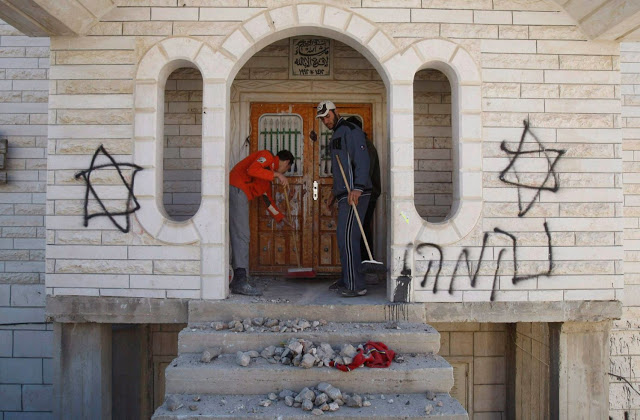 |
| Residents clean a Palestinian house that was attacked by Jewish settlers in the West Bank city of Hebron, December 5, 2008.REUTERS |
Jews between 1948 and 1967. Celebrating renewed Jewish access and praying at
these holy places is understandable; however Mizrachi’s planned activities
venture beyond celebration into highly contentious territory and provocation,
mixing political acts with religious celebrations. The trip aims to tacitly
reinforce the same lesson I was taught in my youth: that supporting Israel’s
presence in the entire land is an intrinsic and necessary part of supporting
Israel.
recent book, Not in God’s Name, discusses the importance of interpreting
religious texts and obligations in a way that is consistent with peace and
tolerance. He has earned a reputation for being thoughtful, measured and
conciliatory. Last year he won the prestigious Templeton Prize in recognition
of his appreciation and respect towards all faiths, for promoting the
importance of recognizing the values of each of them, and for his inter-faith
work.
concerns about the occupation, remarks for which he was much criticised by
some in the Orthodox community.
to support Israel must require supporting the occupation, and some of its most
radical settlers, has serious consequences. Many in the Diaspora accept this
message, impeding real dialogue about how we can best support Israel, and about
the plurality of views. Others see how Judaism, Zionism and the occupation are
being presented as an indivisible whole and reject the former as well as the
latter, at great cost to our community.
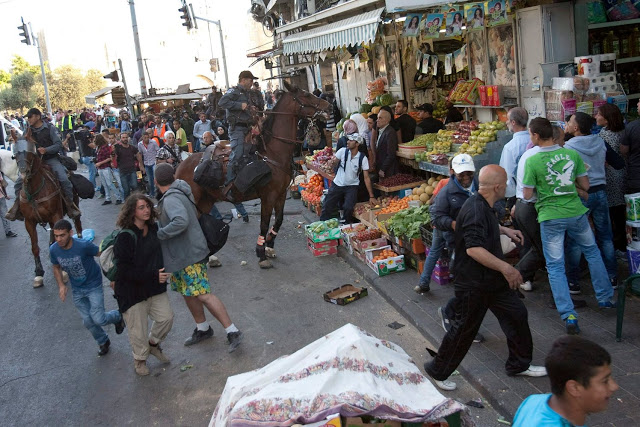 |
| Jerusalem Day at Damascus Gate in east Jerusalem on May 20, 2012.Olivier Fitoussi |
by one of the world’s most respected rabbis sends a message of normalization
and acceptance of the occupation by the mainstream Jewish community. Many Jews
in the Diaspora work hard to emphasize that being Jewish is not synonymous with
supporting the Israeli government, and that supporting Israel’s right to exist
is not synonymous with supporting the occupation. Rabbi Sacks’ actions risk
undermining these messages.
implications of his trip on Diaspora communities, and asking that he reconsider
his involvement in these events. We hope that together we can work towards a
more honest dialogue about Israel, one in which we directly engage with the
occupation rather than airbrushing it out.
Fellow for 2017/2018 currently living in Jerusalem. Follow her on Twitter: @12AnnaBanana
Jerusalem Day is approaching, and with it my anxiety. Since
I was a young boy, Jerusalem Day, in which Israelis mark what they call the
“reunification” of West and East Jerusalem, is a difficult and strange day for
me. A day of rage, grief, and lack of security.
In my childhood I witnessed right-wing Israelis violently
rampaging through the Old City, and especially in the Muslim Quarter where I
lived. These rampaged only intensified over the years, due to the security
situation as well as the leniency of the authorities. Those who celebrate
Jerusalem Day know full well that these kinds of actions are an outright
provocation toward the city’s Muslim inhabitants. This is especially felt in
the Muslim Quarter.
Take the day off
The violence usually takes place right under the nose of
Israeli security forces. Right-wing extremists provoke us by aggressively
banging on our doors and target young Arabs. The reason is simply: they know
that the young are easily riled up. And if anyone dare think of responding, we
all know who the police will believe. The rampages end with a giant march
through Damascus Gate, during which Israelis are accompanied by a large police
presence. The truth is they don’t need the police; most of them are armed with
automatic rifles, and can eliminate any threat. After all, they already have
permission to do so.
My parents would forbid me from leaving the house on
Jerusalem Day. They told me that the intense heat could give me heat stroke. I
do not know how my mother thought that this was going to convince a child like
myself; after all, it was clear to me as a young kid that the weather was
perfect for, say, a family outing. I know that there was something wrong with
their claim, and the Hebrew songs being sung under our home, along with a dramatic
increase in traffic in our neighborhood, was enough of a reason to understand
that this was far more serious that a “hot day.” Over time I understood that my
family forbade me from going outside because they wanted us to protect our
home. It was no coincidence that my father took a day off on Jerusalem Day,
spending all day in front of the television and the window with a newspaper and
cup of coffee.
Today I try to avoid Jerusalem on this day. I do my best to
go places that can help me forget the fact that I live in Jerusalem. Two years
ago, I spent the day with a Hebrew book on the beach, reading and translating
all the new words I was learning. But now I developed a new habit that has
changed my life: I take my computer, go to the beach, and write every thought
that comes to mind.
Like a cancer
I know that the demonstrations, the racist marches, the
anti-Arab slogans (“Jews have a soul, Arabs are sons of bitches”) will never
end on this day. The police is not interested in confronting the extremists,
meanwhile the government doesn’t want to be seen as sympathetic to Arabs. Thus,
no one takes any proactive steps to stop the incitement, which only causes the
situation to worsen. In fact, at the end of Jerusalem Day, the police set up a
giant, blue human wall to prevent confrontations between Palestinian residents
and the celebrants, who paralyze an entire city to celebrate this day.
On Jerusalem Day, you will be able to hear politicians on
both the right and the left who pretend to celebrate this day, emphasizing that
Jerusalem is a special city, despite those who don’t see it as a unified city.
I, on the other hand, invite all these politicians to take a short tour of
Jerusalem to show them the obvious: that Jerusalem is not unified — it is
shattered to pieces. One side enjoys modernization, while the other is the
victim of deliberate policies of neglect, poverty, and crime that take over the
Arab neighborhoods like a cancer in the body.
Suleiman Maswadeh is an activist who studies
political science and communications. This article was originally published
in Hebrew on Local Call.
Why
Rabbi Sacks Is Wrong: Palestinians Don’t Have to Be anti-Semites to Be
anti-Zionists
former British chief rabbi is a wise and brilliant man, but his recent essay
does to Palestinians what anti-Semitism does to Jews: it dehumanizes them.
Apr
06, 2016 1:46 PM
Jonathan Sacks, the former British chief rabbi, for lunch. He just doesn’t know
it.
weekly Parsha on YouTube. Sacks’ erudition—not just about Jewish texts but also
about Western history, philosophy and literature—is extraordinary. Once,
sitting in a synagogue in London, I came across an essay in which he employed
the African-American scholar Henry Louis Gates Jr’s work on Br’er Rabbit, the
wily trickster from Southern folk tales, to understand the Biblical Jacob. I
was amazed. How many Orthodox rabbis read African-American literary criticism?
And even if they did, how many would dare use it to analyze one of the
Patriarchs?
siddur. I’ve led Seders from his Haggadah. He’s a wise and brilliant man. Which
is why his recent essay declaring that, “Anti-Zionism is the new Anti-Semitism,” is so
disappointing.
within the culture. In the Middle Ages, it was religion. In post-Enlightenment
Europe it was science. Today it is human rights.” Thus, Sacks argues,
today’s anti-Zionism—which on human rights grounds challenges not merely
Israel’s policies, but its very existence as a Jewish state—is merely
anti-Semitism in a new guise.
medieval Jews deserved blame for the murder of Christ, or that nineteenth
century Jews were genetically inferior, had no rational basis. To believe it,
you had to be an anti-Semite. It’s not irrational, however, to believe that
Israel is seriously abusing Palestinian human rights. Anti-Semites may exploit
those abuses to vilify Jews. But you don’t have to be anti-Semite to find them
profoundly troubling. In the film The Gatekeepers, one former Shin Bet head,
Avraham Shalom, says that in the West Bank, Israel has become “a brutal occupation force.” Another,
Carmi Gillon, says “We are making the
lives of millions unbearable.” There’s no place in Sacks’ historical schema
for them.
Middle East with a free press and independent judiciary.” But in the West
Bank, Israel is none of those things. The vast majority of people in the West
Bank are Palestinians who cannot vote for the state that controls their lives.
They are not citizens of the country in which they live. Their Jewish neighbors
enjoy a free press and an independent judiciary. But West Bank Palestinians
live under military law, which, among other things, forbids ten or more of them
from gathering for a political purpose without prior approval
from the Israeli military, even if they gather in someone’s home.
impossible to understand contemporary anti-Zionism without them. Palestinians
didn’t become anti-Zionists because they needed a rationale for hating Jews and
found the old ones outdated. They become anti-Zionists because their experience
with Zionism was extremely rough.
majority of people in British mandatory Palestine. Like colonized peoples
around the world, they began developing a national consciousness and a national
movement aimed at securing their independence. As Jews began migrating to
Palestine in large numbers, the Zionist movement—which sought a Jewish
state—became an obstacle to their national desires.
rejection of the 1947 partition plan) and committed crimes (for instance, the
1929 Hebron massacre). But you don’t have to consider Palestinians blameless to
understand why they might view Zionism in a negative light. After all, it was a
Zionist army that displaced roughly 700,000 Palestinians between 1947 and 1949
and would not let them return. A Zionist army controls the Palestinians who
live without basic rights in the West Bank. A Zionist army oversees Israel’s
partial blockade of the Gaza Strip.
But the vast, vast majority of Palestinians are anti-Zionist. Even most
Palestinian citizens of Israel (often called “Arab Israelis”) vote for parties
that seek to turn Israel into something other than a Jewish state.
Boycott, Divestment and Sanction (BDS) movement began with a call from
Palestinian civil society groups in 2005. Since then, BDS—and the anti-Zionism
that undergirds it—has grown in direct proportion to Israeli policy. When
Zionism, as practiced by Benjamin Netanyahu’s government, means entrenching
Israel’s undemocratic control over millions of stateless Palestinians in the
West Bank, converting people to anti-Zionism becomes easier. As BDS leader Omar
Barghouti declared in 2014, “We’ve got to
give credit to Netanyahu. Without him we could not have reached this far.”
Palestinian anti-Zionists are anti-Semites. But equating anti-Zionism and
anti-Semitism means claiming that virtually all Palestinians are anti-Semites,
even Palestinians like Knesset Member Ayman Oudeh, whose political party,
Hadash, includes Jews, or intellectuals like Ahmad Khalidi and commentators
like Rula Jebreal, who have Jewish spouses.
Amalekites. By denying that they might have any reason besides bigotry to
dislike Zionism, it denies their historical experience and turns them into mere
vessels for Jew-hatred. Thus, it does to Palestinians what anti-Semitism does
to Jews. It dehumanizes them.
can be a Zionist, and celebrate the miraculous rebirth of Jewish statehood in
the land of Israel, yet also recognize why Palestinians—even Palestinians who
don’t hate Jews—might see our blessing as their curse. One might even call that
recognition, to borrow the words of a great man, the “dignity of difference.”
